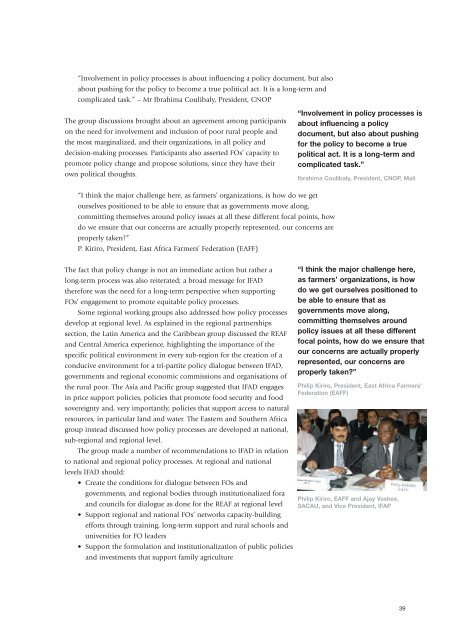Report of the 2008 global meeting - IFAD
Report of the 2008 global meeting - IFAD
Report of the 2008 global meeting - IFAD
You also want an ePaper? Increase the reach of your titles
YUMPU automatically turns print PDFs into web optimized ePapers that Google loves.
“Involvement in policy processes is about influencing a policy document, but also<br />
about pushing for <strong>the</strong> policy to become a true political act. It is a long-term and<br />
complicated task.” – Mr Ibrahima Coulibaly, President, CNOP<br />
The group discussions brought about an agreement among participants<br />
on <strong>the</strong> need for involvement and inclusion <strong>of</strong> poor rural people and<br />
<strong>the</strong> most marginalized, and <strong>the</strong>ir organizations, in all policy and<br />
decision-making processes. Participants also asserted FOs’ capacity to<br />
promote policy change and propose solutions, since <strong>the</strong>y have <strong>the</strong>ir<br />
own political thoughts.<br />
“Involvement in policy processes is<br />
about influencing a policy<br />
document, but also about pushing<br />
for <strong>the</strong> policy to become a true<br />
political act. It is a long-term and<br />
complicated task.”<br />
Ibrahima Coulibaly, President, CNOP, Mali<br />
“I think <strong>the</strong> major challenge here, as farmers’ organizations, is how do we get<br />
ourselves positioned to be able to ensure that as governments move along,<br />
committing <strong>the</strong>mselves around policy issues at all <strong>the</strong>se different focal points, how<br />
do we ensure that our concerns are actually properly represented, our concerns are<br />
properly taken?”<br />
P. Kiriro, President, East Africa Farmers’ Federation (EAFF)<br />
The fact that policy change is not an immediate action but ra<strong>the</strong>r a<br />
long-term process was also reiterated; a broad message for <strong>IFAD</strong><br />
<strong>the</strong>refore was <strong>the</strong> need for a long-term perspective when supporting<br />
FOs’ engagement to promote equitable policy processes.<br />
Some regional working groups also addressed how policy processes<br />
develop at regional level. As explained in <strong>the</strong> regional partnerships<br />
section, <strong>the</strong> Latin America and <strong>the</strong> Caribbean group discussed <strong>the</strong> REAF<br />
and Central America experience, highlighting <strong>the</strong> importance <strong>of</strong> <strong>the</strong><br />
specific political environment in every sub-region for <strong>the</strong> creation <strong>of</strong> a<br />
conducive environment for a tri-partite policy dialogue between <strong>IFAD</strong>,<br />
governments and regional economic commissions and organisations <strong>of</strong><br />
<strong>the</strong> rural poor. The Asia and Pacific group suggested that <strong>IFAD</strong> engages<br />
in price support policies, policies that promote food security and food<br />
sovereignty and, very importantly, policies that support access to natural<br />
resources, in particular land and water. The Eastern and Sou<strong>the</strong>rn Africa<br />
group instead discussed how policy processes are developed at national,<br />
sub-regional and regional level.<br />
The group made a number <strong>of</strong> recommendations to <strong>IFAD</strong> in relation<br />
to national and regional policy processes. At regional and national<br />
levels <strong>IFAD</strong> should:<br />
• Create <strong>the</strong> conditions for dialogue between FOs and<br />
governments, and regional bodies through institutionalized fora<br />
and councils for dialogue as done for <strong>the</strong> REAF at regional level<br />
• Support regional and national FOs’ networks capacity-building<br />
efforts through training, long-term support and rural schools and<br />
universities for FO leaders<br />
• Support <strong>the</strong> formulation and institutionalization <strong>of</strong> public policies<br />
and investments that support family agriculture<br />
“I think <strong>the</strong> major challenge here,<br />
as farmers’ organizations, is how<br />
do we get ourselves positioned to<br />
be able to ensure that as<br />
governments move along,<br />
committing <strong>the</strong>mselves around<br />
policy issues at all <strong>the</strong>se different<br />
focal points, how do we ensure that<br />
our concerns are actually properly<br />
represented, our concerns are<br />
properly taken?”<br />
Philip Kiriro, President, East Africa Farmers’<br />
Federation (EAFF)<br />
Philip Kiriro, EAFF and Ajay Vashee,<br />
SACAU, and Vice President, IFAP<br />
39

















